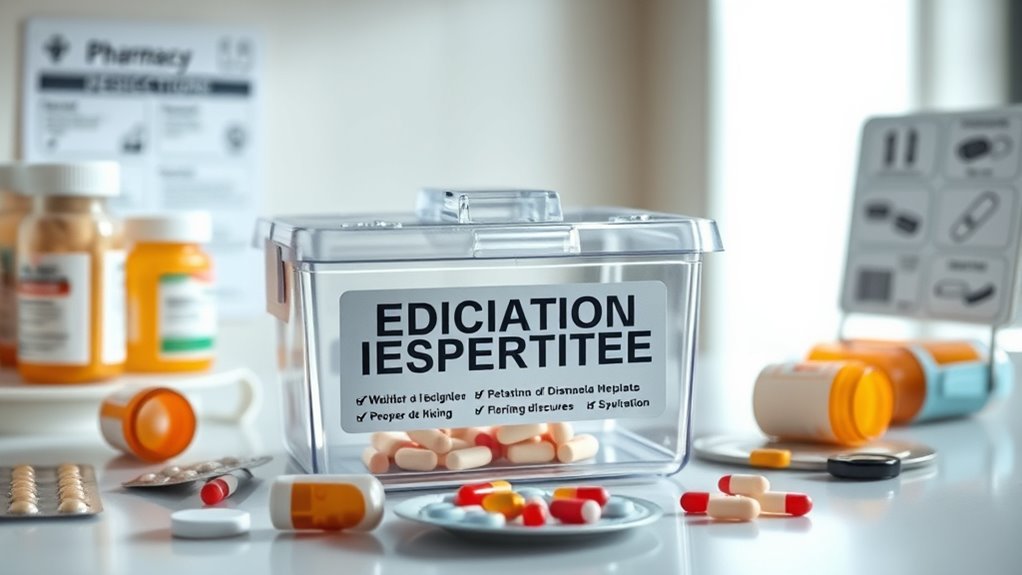To safely dispose of expired medications, check if your community offers take-back programs or designated drop-off sites. If not, remove personal info from the bottles, crush pills into a powder, and mix them with dirt or coffee grounds before sealing and trashing. Avoid flushing medicines to protect water sources. Proper disposal helps prevent misuse, environmental harm, and protects your community. Keep informed about local guidelines for secure and responsible medication management.
Key Takeaways
- Use designated drug take-back programs or disposal sites to safely discard expired medications.
- Mix medications with unappealing substances like dirt or coffee grounds before disposal.
- Remove labels and store medications out of reach of children and pets until disposal.
- Follow local guidelines for safe disposal, avoiding flushing medications unless instructed.
- Protect the environment and community by avoiding trash or water disposal of expired drugs.
Understanding the Risks of Improper Disposal
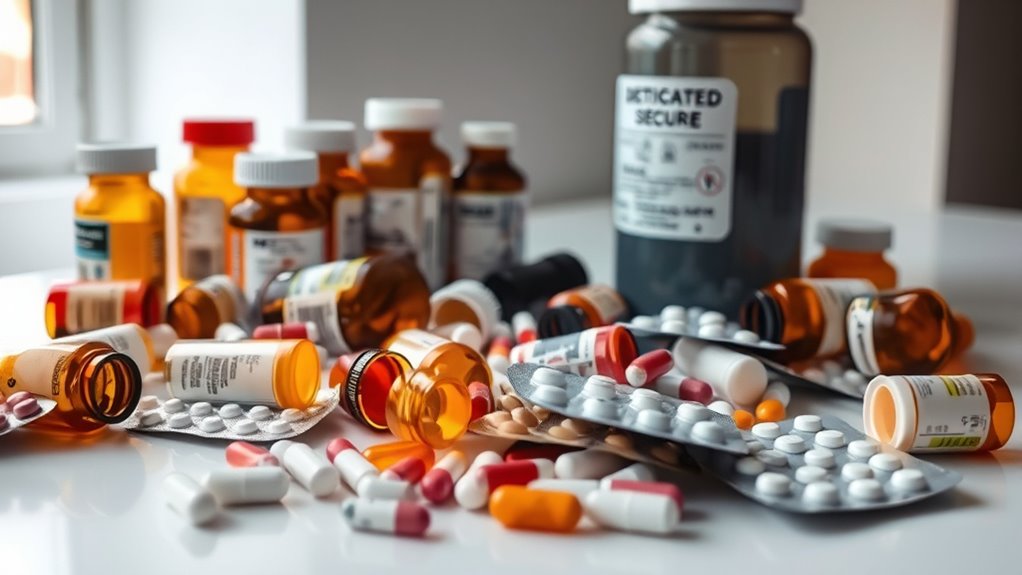
Improper disposal of expired or unused medications can pose serious health and environmental risks. When medications are discarded incorrectly, they can contaminate water supplies and soil, leading to drug contamination that harms wildlife and ecosystems. Additionally, leftover drugs in the wrong hands increase the risk of misuse, overdose, and accidental poisoning, compromising medication safety. Flushing medications down the toilet or tossing them in the trash may seem convenient, but it can introduce harmful chemicals into the environment and increase the chance of drug diversion. Understanding these dangers emphasizes the importance of proper disposal methods. Vetted medication disposal programs and guidelines help ensure medications are disposed of safely and responsibly. Safeguarding public health and protecting the environment depends on recognizing the risks associated with improper medication disposal and taking steps to prevent them.
Check for Local Disposal Programs and Guidelines

To guarantee you dispose of medications safely, start by checking if your community offers specific disposal programs or guidelines. Many areas have local programs that provide safe ways to discard expired drugs, reducing environmental impact and preventing misuse. Look up your town or city’s disposal guidelines online or contact local health authorities. Some communities have designated drop-off points or scheduled collection events. Use the table below to compare typical local programs and guidelines:
| Local Programs | Disposal Guidelines |
|---|---|
| Drop-off boxes available | Remove labels and mix medications with undesirable substances |
| Scheduled collection days | Do not flush medications unless instructed |
| Pharmacy take-back services | Keep medications in original containers with labels |
| Community disposal events | Keep medications out of reach of children and pets |
| Mail-back programs | Check for specific disposal instructions |
Using Take-Back Events and Drop-Off Locations
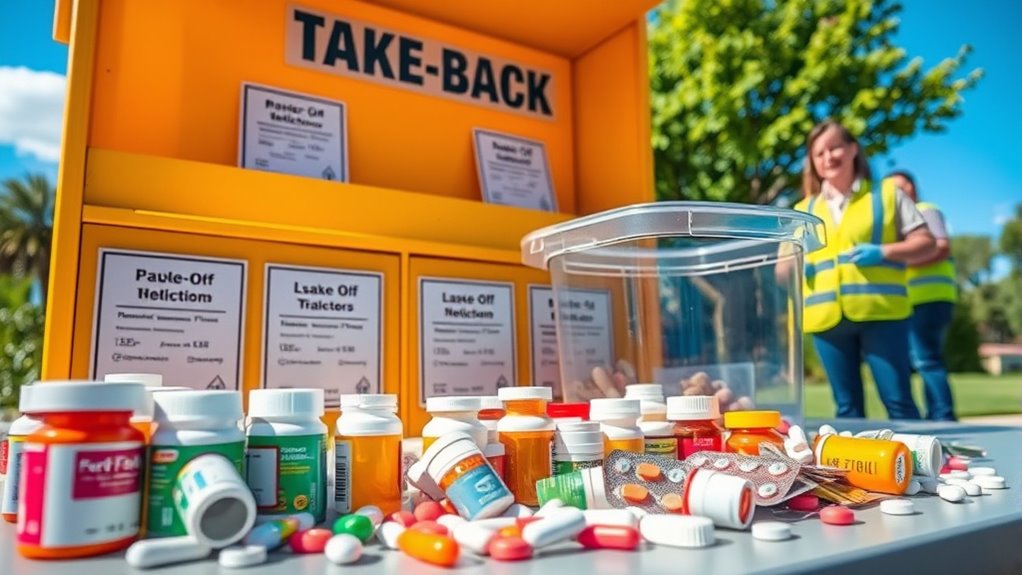
Using take-back events and drop-off locations is one of the safest ways to dispose of expired or unused medications. These disposal events are often organized through pharmacy partnerships, making it easy for you to find secure collection sites. Local pharmacies frequently collaborate with community organizations or government agencies to host disposal events, ensuring medications are handled safely and responsibly. When you participate in these programs, you can drop off your medications without worrying about environmental harm or misuse. These drop-off locations are typically secure, anonymous, and accessible, making disposal convenient and safe for you and your community. Taking advantage of pharmacy partnerships and disposal events helps prevent medication theft, accidental poisoning, and pollution, supporting public health and safety. Additionally, understanding regulatory compliance can help ensure that disposal methods meet legal standards and protect public health.
Safe Disposal at Home: What You Need to Know
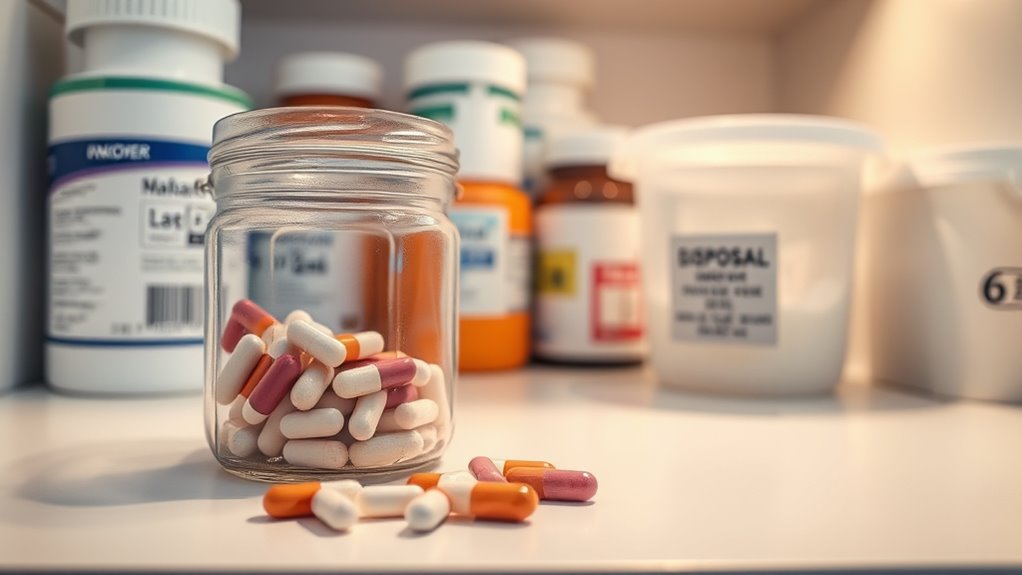
While take-back programs are ideal for safe medication disposal, sometimes you need to do it at home. To guarantee disposal safety, you must handle expired drugs carefully to prevent accidental ingestion or misuse. Proper medication storage keeps your drugs out of reach of children and pets until disposal time. When disposing at home, follow these steps:
- Mix medications with unappealing substances like dirt or coffee grounds.
- Place the mixture in a sealed plastic bag or container.
- Remove personal information from prescription bottles.
- Dispose of the sealed container in your household trash.
- Contrast ratio affects how well you can see details in your home theater setup, so consider this when choosing your projector for movie nights.
Always check local guidelines for disposal safety and avoid flushing medications unless specifically instructed. Proper at-home disposal helps protect your loved ones and the environment.
How to Prepare Medications for Disposal

Before disposing of medications, you need to prepare them properly to guarantee safety and effectiveness. Start by removing any labels from containers to protect your personal information and prevent confusion. If the medication is in pill form, consider pill crushing to make disposal easier, especially for large or hard pills. Use a pill crusher or a sturdy object like a spoon, and crush the pills into a fine powder. Mix the crushed pills with an undesirable substance like dirt or used coffee grounds to make them less appealing and harder to misuse. Place the mixture in a sealed plastic bag or container before discarding. Proper preparation helps prevent accidental ingestion and misuse, ensuring safe disposal and protecting your loved ones and community. Additionally, being aware of medication disposal guidelines can help you follow proper procedures and avoid environmental harm.
Tips for Communicating With Family and Caregivers
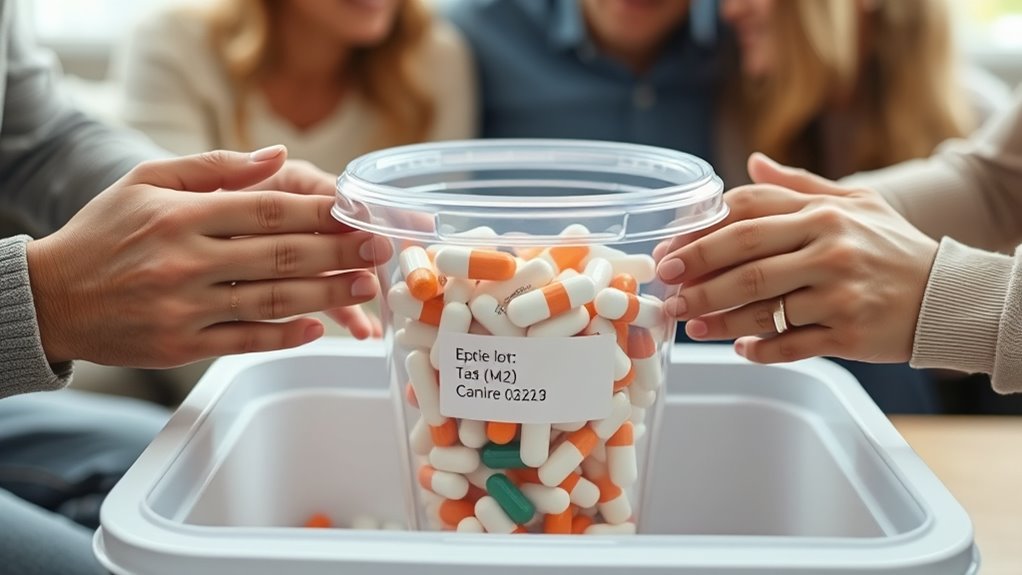
Openly sharing clear medication instructions helps everyone stay informed and safe. When you communicate disposal plans, you reduce confusion and guarantee proper handling of expired drugs. Address family concerns directly to build trust and make the process smoother for everyone involved. Incorporating safe disposal methods into your discussions ensures that all parties understand how to properly discard medications, reducing environmental impact and health risks.
Clear Medication Instructions
Clear medication instructions are essential for guaranteeing your family and caregivers understand how to safely manage medications. Proper medication labeling and clear dosage instructions prevent mistakes and ensure safety. To communicate effectively:
- Always review and update medication labels with current instructions.
- Use simple language when explaining dosage instructions to avoid confusion.
- Demonstrate how to measure or administer medication correctly.
- Encourage questions to confirm understanding.
- Recognize that soulmate angel numbers can serve as signals of harmony and alignment in your relationships, emphasizing the importance of clear communication and understanding.
Share Disposal Plans
Effective communication about disposal plans is vital to guarantee everyone involved knows how to safely get rid of expired or unused medications. Sharing your disposal plans helps ensure proper medication storage and prevents accidental ingestion. Talk openly with family members and caregivers about how you plan to dispose of medications, emphasizing the importance of disposal awareness. Explain where medications are stored and why timely disposal is crucial for safety. Encourage everyone to ask questions and stay informed about safe disposal methods. Clear communication reduces confusion and minimizes the risk of someone mishandling expired drugs. By sharing your plans, you help create a safer environment and promote responsible medication management within your household. Remember, everyone plays a role in maintaining medication safety. Utilizing proper disposal methods can further enhance safety and prevent potential misuse or environmental harm.
Address Family Concerns
Since family members and caregivers are directly involved in managing medications, addressing their concerns is essential for safe disposal. Open communication helps ease worries about medication safety and ensures everyone understands the process. To effectively address family concerns:
- Explain why proper disposal matters for safety and environmental health.
- Listen to their questions and acknowledge any fears or misconceptions.
- Share clear, simple disposal steps to reduce confusion.
- Reassure them that disposal is a responsible way to protect loved ones and the community.
- Discuss the availability of self waterings or other safe disposal options to promote understanding and trust.
Protecting the Environment and Your Community

Proper disposal of expired medications helps prevent contamination of water and soil, protecting your community’s environment. By choosing safe methods, you reduce the risk of drugs falling into the wrong hands or harming wildlife. Taking responsibility for disposal supports a healthier, safer community for everyone. Incorporating wall organization systems can also help organize medication storage at home, reducing clutter and promoting safety.
Proper Disposal Methods
To protect both the environment and your community, it’s essential to dispose of expired medications safely and correctly. Proper disposal prevents contamination and misuse. First, check your medication storage for any expired drugs, ensuring bottles still have clear prescription labeling. Second, consider using medication take-back programs or authorized disposal sites—they’re the safest options. Third, if no disposal programs are available, mix the medications with unappealing substances like dirt or coffee grounds, then seal them in a plastic bag before throwing them away. Fourth, never flush medications unless the label specifically instructs you to do so. Always read disposal instructions carefully and follow local regulations to keep your community safe and protect the environment from harmful substances. Additionally, understanding gelato flavors and their quality can help you choose appropriate treats if you’re testing new flavors at home or on the go.
Preventing Environmental Harm
Disposing of medications correctly not only keeps your home safe but also prevents environmental contamination. When medications are thrown away improperly, they can seep into soil and water, harming wildlife and contaminating drinking supplies. This impacts the environment and challenges medication safety efforts. By using designated disposal programs or drug take-back events, you reduce the environmental impact of expired drugs. Flushing medications can introduce chemicals into water systems, affecting aquatic life and human health. Proper disposal methods help protect your community’s water quality and preserve natural resources. Being mindful of how you dispose of expired drugs supports environmental health and promotes medication safety for everyone. Taking these steps ensures you’re doing your part to safeguard both your community and the planet.
Frequently Asked Questions
Are There Specific Medications That Should Never Be Disposed of at Home?
You might wonder if any medications should never be disposed of at home. For medication safety, certain drugs, like opioids, hormones, or chemotherapy agents, require special disposal methods due to their potential risks. Always follow disposal guidelines provided by your pharmacist or local authorities to prevent misuse or environmental harm. Never flush or throw away these medications in the trash unless specifically instructed, as improper disposal can pose serious health and safety concerns.
How Can I Identify if My Local Disposal Program Is Still Active?
To find out if your local disposal program is still active, start by checking disposal program updates online or contact your local health department. Visit local disposal sites or their websites for current information. You can also call them directly to confirm. Staying informed guarantees you dispose of medications safely and responsibly, preventing misuse or environmental harm. Regularly checking for updates keeps you aware of any changes or new disposal options.
What Should I Do if I Can’T Find a Nearby Disposal Site?
You might wonder if there’s a safe way to get rid of expired drugs when local disposal sites aren’t available. Investigate alternative disposal methods, like mixing medications with unappealing substances and discarding them in your trash. You can also consider mailing medication return programs, which are secure and environmentally friendly. These options help guarantee you dispose of medications safely, even when nearby disposal sites are hard to find.
Can I Dispose of Medications in the Trash if They Are Sealed?
If your medications are sealed, you might think trash disposal is okay, but it’s better to be cautious. Sealed medications can still pose risks if someone finds them, so crush or mix them with unappealing substances like dirt or coffee grounds before trashing. Always follow local guidelines for trash disposal, and consider using a medication take-back program when possible. Your goal is to prevent misuse and protect the environment.
Are There Any Legal Considerations for Disposing of Controlled Substances?
Imagine finding a way to dispose of your controlled substances safely—it’s more than just good practice. You need to follow regulatory compliance and prescription regulations to avoid legal trouble. Disposing of controlled substances improperly can lead to fines or legal issues. Always check with local authorities or take-back programs, because these guarantee you’re adhering to laws designed to keep everyone safe and maintain proper drug disposal standards.
Conclusion
By choosing safe disposal methods, you’re helping keep your community and environment healthy—and ensuring your loved ones stay protected. Think of it as planting seeds for a brighter, safer future where everyone can thrive. When you handle expired medications responsibly, you’re not just tidying up your medicine cabinet; you’re nurturing trust and harmony around you. Small actions, like these, can lead to a world where safety and well-being bloom effortlessly.
